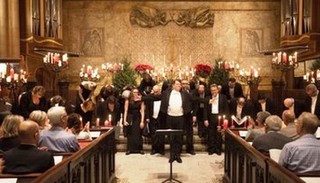|
Back
Glories of the Equinox New York
The Brick Church
03/20/2019 -
“A Voice Of Her Own: Great Choral Music by Women Composers”
Lili Boulanger: Hymn to the Sun – Daily Prayer for the Whole Universe – Deep in the Forest – Psalm 24
Cécile Chaminade: Dance at Twilight, Opus 133
Jocelyn Hagen: Two excerpts from Amass
Fanny Mendelssohn: From Four Song Without Words, Opus 8: No. 3. Larghetto – From Garden Songs, Opus 3: No. 1. “Temptation”
Clara Schumann: From Three Mixed Choruses: 2. “Gondola Song” & 3. “Onward”
Ethel Smythe: From Mass in D: “Benedictus”
Amy Beach: Let This Mind Be in You
Florence Price: Praise The Lord
Hildegard von Bingen: You, Rose Blossoms
Bora Yoon: Infinite Light (World Premiere)
Devon Guthrie, Linda Lee Jones (Sopranos), Heather Petrie (Contralto), Brandon Hynum (Tenor), John Brancy (Baritone), Joseph Charles Beutel (Bass-Baritone)
Daoel Beckwith (Piano), Andrew Henderson (Organ), Daire FitzGerald (Cello), Pedro Henriques da Silva (Guitar)
Voices of Ascension, Dennis Keene (Artistic Director and Conductor)

Voices of Ascension, D. Keene (© Courtesy of the Artists)
“Loud music is too harsh for ladies heads/Since they love men in arms as well as beds”
William Shakespeare, Pericles
The Bard was not quoting himself, of course. Yes, vocal music was confined to boys and men in Elizabethan times, but Shakespeare would hardly look askance as a female Dowland.
Female composition was foundation for an intriguing concert last night by the formidable Voices of Ascension (VOA) in the Brick Church. That edifice has nowhere near the architectural glory of the usual VOA venue, Fifth Avenue’s Church of the Ascension. The frequent applause resembled a school concert rather than a mighty Mass or oratorio. But the point of “Voice of Her Own” was neither religion nor redoubtable oratorio. It was in celebration women composers through the ages.
Dennis Keene is the longtime Artistic Director and Conductor of VOA, and while his expertise is acknowledged, his program notes here were more than educational: they were personally enlightening. Instead of a piece by Amy Beach, he quoted a teacher who had known the modest composer. Instead of music by Nadia Boulanger’s lesser-known sister, Lili, Mr. Keene noted how a certain work was “exquisite, sensitive...”
Still, the subtitle of the concert, “Great Choral Music of Women Composers” was not absolutely true. Fanny Mendelssohn’s two works were deftly crafted, elegant and bland, her song Temptation resembling a Germanic Stephen Foster. The pair from Jocelyn Hagen’s Amass (a jeu de mots for her eclectic references) was again well done, forged with care, would do credit to any church. But was hardly in the “great” category.
Still, this concert had not only stellar performances (one expects nothing less from this iconic NY choral group), but greatness. In fact, Lili Boulanger’s opening Hymn to the Sun, and the final 24th Psalm (the latter one of VOA’s frequent offerings) were both powerful, stentorian, even fiercely resplendent. Ms. Boulanger was Gallic to the core with Debusssyan harmonies, yet her lines breathed utter strength.
Her choral work, Sous-Bois (”Deep in the Forest”) was equally beautiful, though reading the first verse, I was reminded of Schoenberg’s opening verse for “Transfigured Night”. Brrrrrr.
The other French composer was Cécile Chaminade, who is unfairly called “a salon composer.” True, I doubt if she wrote symphonies or operas, but one could tell she had been a great pianist with her Dance at Twilight, danceable, lighter than a Mendelssohn, far more than pretty-pretty.
One has to use....er...masculine adjectives for Ethel Smyth, a musical, political, social force from Great Britain, exiling herself to Europe. An opera presented last year was terrific listening. This Benedictus was reminiscent of the Bach women’s chorus from the Magnificat, the female singers–and the splendid soprano solo–both magnificent and holy. Like Lili Boulanger, who she doubtless met in Paris, nothing was refined or genteel. She was a tough person, her creativity was equally tough.
I had heard the name Amy Beach often enough, and had heard her chamber music. Her church hymn here was quite lovely, and Devon Guthrie’s soprano solo gave the piece an ethereal sound.

H. von Bingen/B.Yoon (© Samuel A. Dog)
Still, the most brilliant programming of this joyful concert started with the oldest work, Hildegard de Bingen’s Twelfth Century You, Rose Blossoms, and the newest piece, Bora Yoon’s Infinite Light, commissioned by the Voices of Ascension for this concert.
Sister or (Mother Superior?) Hildegard’s work encompassed her love for (in Conductor Keene’s words) the “botanical, biological and spiritual”. In fact, one would love to hear a concert of Hildegard down in the Medieval Garden of the Cloisters. Perhaps even with a lecture on the start of medicine with the fruits of these flowers.
The wish was not important. Far greater–in fact by far the most transcendent and ethereal work–came from the sextet of VOA women, led by soprano Linda Lee Jones, in this perfect work. Yes, it was only plainchant, yet the voices soared, the repetition of phrases offered not so much a through-composed piece as one with structure, with tension, with a joyous reverence.
I was more than anxious to hear the new piece by Bora Yoon, for she is a force of nature as well as creator. I had heard (and seen) Ms. Yoon in many works where she danced, played viola, pranced onto a pulpit, providing the happiest religious and secular shows.
Here, Ms. Yoon modestly sat in the audience. But her work–for electronic sounds and the full Voices of Ascension–was hardly modest. And that, for this listener, was not quite right.
Her texts were from the resplendent Sufi poetry of Hafiz and Runi, and her choruses were equally resplendent. The music was full, emotional, powerful, the voices of thunderous air and other natural sounds, complementing these most emotional creations.
Yet (and a very hesitant “yet”), in making such a powerful work, the poetry of the great Afghan-Persian poets got lost in the shuffle. This is poetry meant to be uttered by a single voice, these were poets who praised quiet. “Silence is the voice of God,” wrote Rumi, “all else is a translation.”
Add to this the holy breaths of Classical Persian, the single intoning of a boy or man. And Ms. Yoon’s powerful work seems a multitudinous gilding of the Isfahan red rose.
Never mind. Like Dennis Keene’s personal words, mine was a selfish subjective notion. Ms. Yoon’s accomplishments are many, and one could hear this work not as Persian poetry, but a complement to the full equinox moon floating over the church.
Harry Rolnick
|